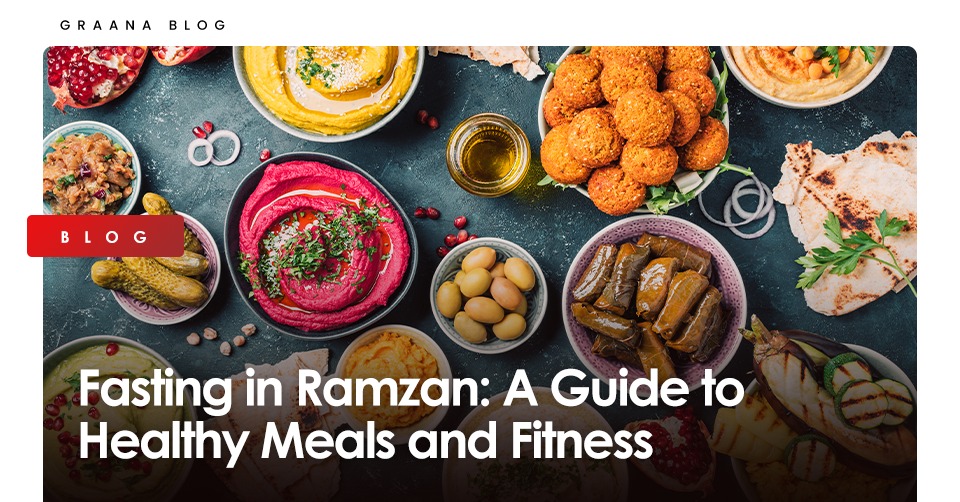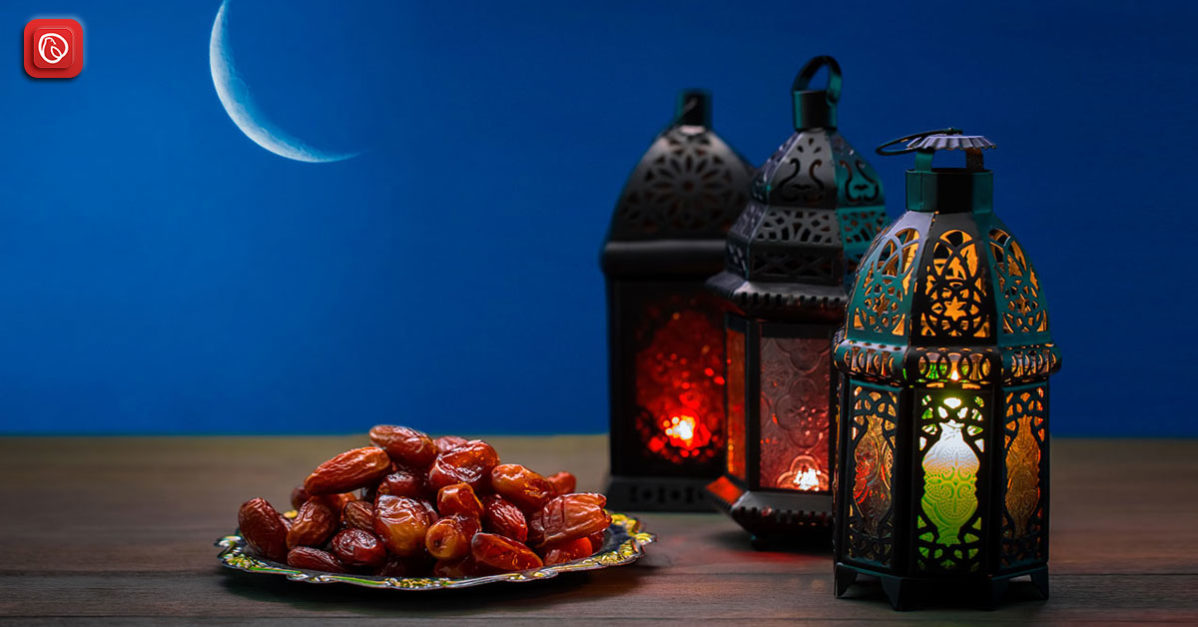With the holy month of Ramzan just around the corner, people are raving with excitement to celebrate this month to their utmost and collect as many blessings as they can.
Aside from being the time to make oneself spiritually better, Ramzan is also a great time for you to incorporate healthy eating habits in your diet plan and enhance your physical fitness. While fasting in Ramzan has a lot of health-related benefits itself, if coupled with eating healthy and nutritious meals, it can be even more beneficial.
Graana.com, Pakistan’s smartest property portal, brings you – Fasting in Ramzan: A Guide to Healthy Meals and Fitness. This guide will help you achieve your fitness goals during Ramzan,2022.
Eating Nutritional and Healthy Meals in Ramzan
Fasting itself is considered healthy for the human body, as it helps to lose weight, reduce oxidative stress, minimise insulin resistance hence lowering the chance of type 2 diabetes, etc.
Because of its health benefits, a lot of people around the world are opting for fasting in normal routines as well, referred to as intermittent fasting.
However, in the majority of Muslim countries, people are habitual of opting for heavy meals at “Iftaar” and “Suhoor” in Ramadan. This can result in gaining more calories instead of enhancing nutritional aspect of the food consumed after fasting for the person.
You should add more nutritional food to your “Suhoor” and “Iftaar” meals and cut down on the oily food that is rich in calories. This will not only help you stay nourished throughout the day but will also be beneficial for your health in the long run, even after Ramzan.
Before Ramzan, you should make a chart for your “Iftaar” and “Suhoor” meals. Make sure to include food from all these five food groups for a well-balanced diet that will help you acheive utmost fitness.
Food Groups |
Sub-groups |
The Food Samples |
|---|---|---|
| Grains |
Whole Grains Refined Grains |
Whole wheat bread, Oatmeal, Brown rice Corn Tortilla, Regular Pasta, Grits |
| Vegetables | Dark Green Vegetables
Red and Orange Vegetables Beans and Peas Starchy Vegetables Other Vegetables |
Broccoli, Spinach, Romaine
Carrot, Sweet Potatoes, Tomatoes Black Beans, Kidney Beans, Lentils, Chickpeas Potatoes, green peas, corn Avocado, Summer squash, Mushrooms |
| Proteins | Seafood
Meat, Poultry, and Eggs Nuts, Seeds, Soy |
Tuna, Trout, Sardines, Shrimp, Crab, Oysters, Mussels etc.
Chicken, Turkey, Eggs, Beef Walnuts, Soy milk, Peanut butter |
| Fruits | Fresh Fruits/ Fruit juice | Orange, Banana, Apple, Watermelon, Melon, Strawberry, Mango, Grapes etc. |
| Dairy Products | Cheese/Milk/Yogurt | Cottage cheese, Low-fat milk, Yogurt, Kefir |
Healthy Meals at Suhoor
“Suhoor” or “Sehri” is the pre-fast meal eaten before dawn. The importance of a “Suhoor” meal cannot be emphasised enough because it is the only source of your energy throughout the day until you break your fast.
This is the reason your Suhoor meal should be wholesome, and moderate, Your ideal suhoor meal should be nutritious and filling, instead of heavy and junk foods. This meal will help you power through the day till Iftaar.
Because your stomach is going to rest all day without any food or water, what you give it at Suhoor will determine a lot of the mood that your stomach will stay in. To avoid any stomach pangs and aches, you should eat slow-digesting foods.
Here is the list of food that takes a longer time to metabolise:
- Eggs
- Fruits and Vegetables
- Water
- Fish/Chicken
- Oatmeal
- Nuts
Eggs

Eggs are a part of our everyday meals. They are a rich source of protein, vitamins, and other nutrients. They are one of the most nutritional foods to eat at Suhoor, as they will leave you feeling full. There are various interesting ways to use eggs in your food.
During Ramadan, you can make an omelette or a scrambled egg for Suhoor, and eat it with a loaf of brown bread. If you are not a big fan of fried eggs, you can go for a boiled one, which can be used as an ingredient in salads.
You can also mash a boiled egg with the help of a fork and spread its paste on a bread slice, then sprinkle some salt and black pepper over it to add flavours.
Fruits and Vegetables

You should always add fruits, and vegetables to your meals, particularly for Suhoor. They provide you with minerals and various nutrients that are essential for you to stay energised while fasting in Ramadan. Also, they help you keep hydrated.
Strawberry, watermelon, melon, grapes, apples, oranges, kiwis etc., are some popular fruits in Pakistan that one can eat. If you don’t like to eat fruits as it is, you can try making a fruit salad.
You can make it easily by mixing different fruits and topping them with some cream. Or the other option is to drink fresh fruit juices.
This way you can not only enjoy a healthy meal at Suhoor but also gain vitamins and nutrients.
Water

As this year Ramzan is going to be during the summer season in Pakistan (which is mostly hot and humid), we must take all the necessary steps to keep ourselves hydrated.
Instead of just relying on water, we should use other methods as well to keep ourselves from dehydration. For this, you need to increase the intake of fresh fruits, and fruit juices to stay hydrated throughout the day during fasting.
Fish/Chicken

Fish and chicken are both rich in proteins. During fasting when you starve yourself for the whole day, it is essential to add vital nutritional foods to your meals to avoid breaking down muscles.
Chicken helps us with losing weight, and it also narrows down the chance of having heart disease. Besides, chicken has the amino acid tryptophan which can increase the Serotonin (the happiness hormone) in our brain.
Fish give us omega-3 fatty acids which are said to be beneficial for heart health. Moreover, they are rich in some other healthy minerals like iron, zinc, calcium, magnesium, potassium etc. that help you maintain your fitness.
Eating fish and chicken can help you avoid muscle breakdown during fasting in Ramadan. However, it is best to avoid eating fried fish, as it can make you thirsty throughout the day. Steamed fish with some pepper and lemon juice sprinkled over it is also a great dish to go with.

Chicken can also be used in various forms. You can boil it and add it to the Salad, or pair it up with vegetables to eat, or just grill it with some baked potatoes for a good meal.
Oatmeal

Oatmeal is perfect for meals in Suhoor, as it is full of nutrients and easy to make. This appetizing meal provides you with proteins and carbohydrates.
You can make a customized oatmeal smoothie by adding some fruits and milk to it. You can add any fruits of your choice to it, for example, blueberry, banana, etc.
People also add nuts sometimes to enhance the flavor and nutrients.
Nuts
Nuts are known for their immense nutritional importance. They take a long time to digest so it is wise to add them to your Suhoor meals.
Fasting throughout the whole day can leave you deprived of energy and nuts work the best to counter that energy deprivation.
There are different types of nuts like walnuts, peanuts, almonds, Pistachio, etc. You can crush and add them to your drinks, for example, smoothies, etc. or you can eat them as it is.
Healthy Meal at Iftaar
After fasting for the whole day during Ramadan, Iftaar is the time when you replenish your energy. So it is essential to choose wisely what you eat at Iftaar.
In Pakistan, people tend to eat more of traditional food at Iftaar which is mostly oily, rich in calories and has low nutrients for instance “Pakora”, “Samosa”, “Kachori”, “Jalebi” etc. These food are no doubt mouth savouring but they are fried and have high levels of sugar, and oil, which makes them less healthy to eat.
Instead, you should go for a balanced Iftaar, to help you restore your energy. Following are the items you should add to your food:
- Water/Fluids
- Dates
- Vegetables
- Good Carbohydrates
- Meats and Alternatives
Water/Fluids

Fluid intake is very important be it Suhoor or Iftaar time. Even though you took enough drank enough water, juices, or ate fruits at Suhoor, throughout the day that got utilised. So, you can not skip drinking water at Iftaar.
Plain water is the best to break your fast, however, you can use other drinks, like lemonade, orange juice, etc. It is essential to drink at least one to two glasses of water before you jump onto eating the food.
Dates

Eating dates in Iftaar is not only a tradition but also a sunnah. Dates give a boost of natural sugar to your body, which is vital.
People often report headaches during the fasting period, the most likely cause of it can be low sugar levels. Eating 2-3 dates at Iftaar can help you regain energy.
Vegetables

Being rich in vitamins, minerals, fibres, and other vital nutrients, they also have very low amounts of calories which is why they are considered so healthy to eat.
Eating vegetable salads is the most common and easy way to add greens to your meals. If you eat vegetable salads try to make them more colorful by adding various types of vegetables to your Iftaar meals during Ramadan.
Not only it will make the salad look more appetizing, but also it will enhance its nutritional importance of it. Eating more vegetables in Ramadan also adds fiber to your diet that not only keeps you full throughout but also helps in digestion.
Good Carbohydrates
Besides other nutrients and vitamins, you should also add complex carbohydrates to your Iftaar. Some of the foods that contain it include brown rice, whole grain pasta, whole grain bread, potatoes, etc.
Complex carbohydrates provide a more steady and maintainable source of energy as well as fibre and minerals.
Meats and Alternatives
Try to incorporate food sources to your meal that are rich in protein, for instance, fish, chicken, eggs, low-fat dairy products etc.
Foods & Meals to Avoid Eating During Ramzan
Some foods and meals leave you deprived of energy and make you feel thirsty, so it is better to avoid them during fasting in Ramzan.
Some of them are mentioned below:
- Foods that have high sugar or added Sugar – Gulab Jamun, Jalebi, Jelly etc.
- Deep-fried foods – Pakora, Samosa, fried Kebab, Kachori etc.
- Fast Food – Burger, Pizza etc.
- Carbonated drinks – Coke, energy drinks, etc.
Ramadan is the best time of the year when you can achieve your fitness goals while fasting, as fasting and fitness go hand in hand. Along with working on your spiritual growth, your should work on your eating patterns as well and adopt healthier eating habits that you can carry throughout the year.
Hopefully, the information provided in this blog was helpful for you to devise your diet chart for Ramzan.
Follow our blog at Graana.com to know more about Ramadan and its festivities.
Read More
- Best Ramzan Home Decoration Ideas in 2021
- How to Maintain Social Distancing During Ramzan
- Best Street Food Options in Islamabad and Rawalpindi




